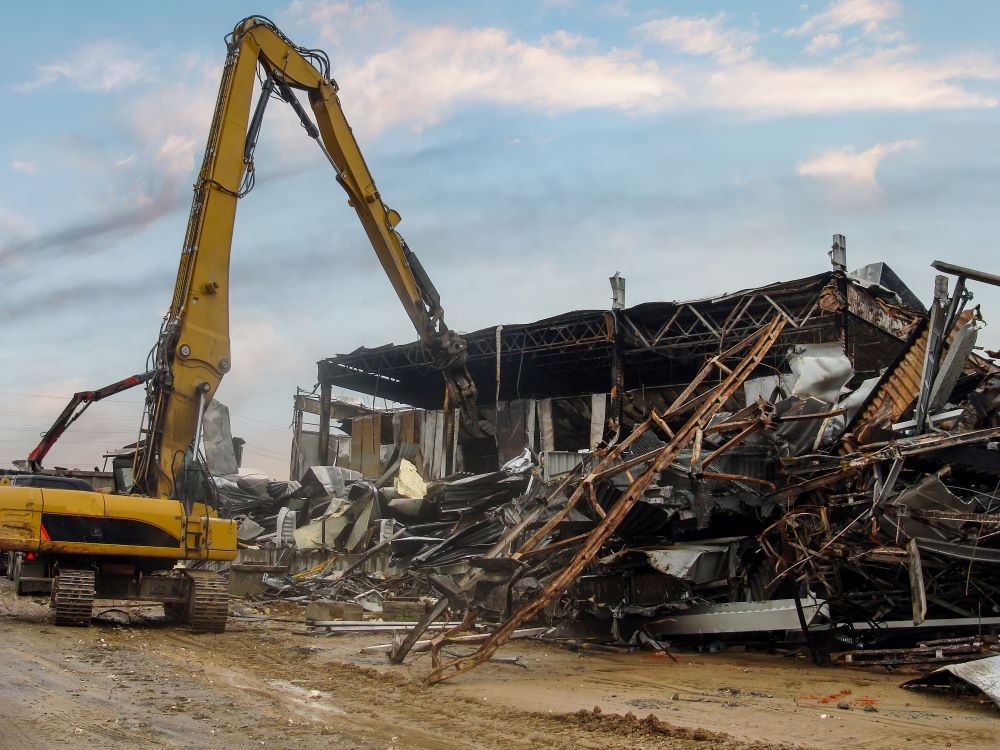
Environmental Regulations for Commercial Demolition Contractor
As a contractor for commercial demolition, are you trying to make your way through the confusing world of environmental regulations? There’s nowhere else to look! To maintain compliance and safeguard the environment, every commercial demolition contractor must be aware of the environmental standards that are covered in this article.
Sustainable and environmentally friendly procedures are becoming more and more important in the building business as people become more aware of the influence they have on the environment. Urban area rehabilitation is greatly aided by commercial demolition contractors, but it is imperative that their work be done in a way that avoids environmental damage and supports sustainable development.
OUR SERVICES
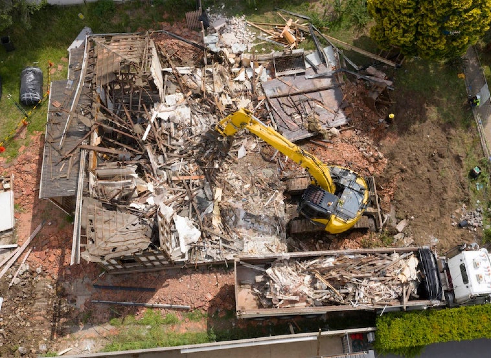
Structure Demolition. Residential, Commercial & Industrial
If your structure poses a health, safety, or environmental risk, demolition can prevent costly citations or fatal accidents. While this may seem daunting, you are just a phone call away from having your residential demolition done professionally, responsibly, and at a great price.
Talk to a Demolition Specialist Now! 916.249.5001
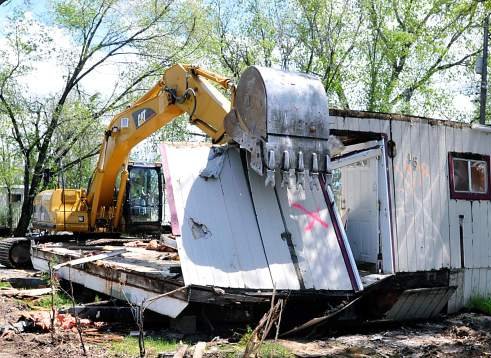
Mobile Home Demolition
We demolish and haul away mobile homes. Any size, anywhere, anyhow. We are fast, clean and competitive. We serve most of Northern California. There are many factors to consider when removing or demolishing your old trailer, mobile home, or manufactured home like: the processes involved, costs, time, contractors, debris, and permits.
Talk to a Demolition Specialist Now! 916.249.5001
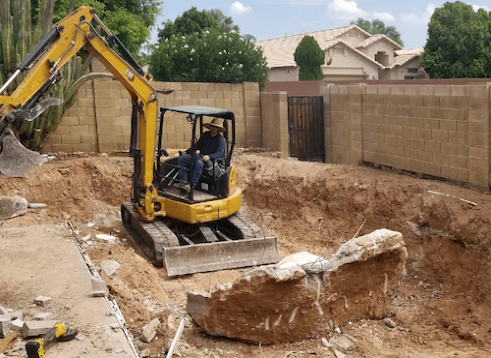
Pool Demolition
When removing a pool in Sacramento, California with the professional demolition team of Maxton Demo, you’re guaranteed peace of mind from beginning to end. From your initial request for an estimate to clean-up, you can expect our pool demolition process that’s completely professional and safe.
Talk to a Demolition Specialist Now! 916.249.5001
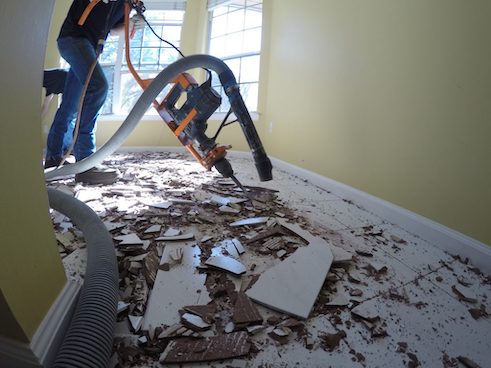
Floor Demolition
Flooring demolition, like any other major home renovation work, requires a specific set of skills and tools to be performed properly. You need experts in flooring demolition to get you the best floors possible. Contact us to find out more about how we can help you today.
Talk to a Demolition Specialist Now! 916.249.5001
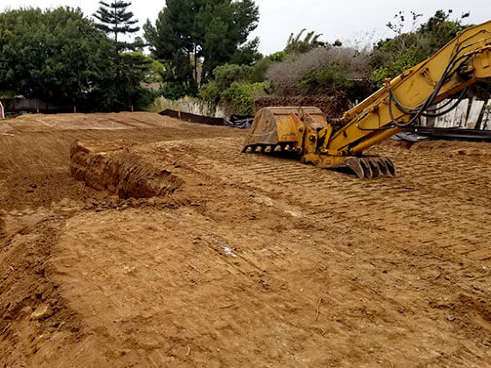
Grading & Excavating
If you need an experienced excavator and grader in Sacramento, call us today. One of the many reasons that residential, commercial, and industrial customers choose to work with us is because we’re able to provide a broad range of services to help construction-related projects get done in less time and at a reduced cost.
Talk to a Demolition Specialist Now! 916.249.5001

Roof Snow Removal
Heavy snow & ice dams can cause significant roof and home damage. Roof Snow removal is our specialty during the winter months. Serving the Sacramento, California area for 10 years, we can get your roof snow removed and promise a quick response and reasonable rates.
Talk to a Demolition Specialist Now! 916.249.5001
The Significance of Adhering to Environmental Regulations
For commercial demolition contractors, adhering to environmental rules is not only legally binding but also morally right. Contractors may aid in the preservation and conservation of the environment by abiding by these rules. Environmental laws are put in place to protect the environment, stop pollution, and promote sustainable growth.
There may be severe legal repercussions for breaking these rules, such as large fines and even jail time. Non-compliance may also cost a contractor commercial prospects and damage their image. Therefore, it is imperative that commercial demolition contractors give compliance first priority and keep up with the constantly changing environmental standards.
Important Environmental Rules for Companies That Perform Commercial Demolition
A variety of environmental laws that are relevant to their operation must be understood by commercial demolition contractors. Environmental evaluations, waste management, and the handling of hazardous items are only a few of the topics covered by these standards. The Resource Conservation and Recovery Act (RCRA), which controls the handling of hazardous waste, is one such law. According to RCRA regulations, contractors must correctly identify, handle, store, and dispose of hazardous items.
The Clean Air Act, which establishes emission restrictions for air pollutants produced during demolition operations, is another requirement that contractors must follow. The National Environmental Policy Act (NEPA), which requires the evaluation of environmental implications before starting some projects, and the Clean Water Act, which controls the release of pollutants into water bodies, are two other important pieces of legislation.
Comprehending Waste Management and Hazardous Materials
If handled improperly, hazardous materials pose a serious danger to both human health and the environment. Contractors who do commercial demolitions need to be well-versed in hazardous materials and their possible effects. Asbestos, lead-based paint, mercury, polychlorinated biphenyls (PCBs), and other compounds are examples of these materials. All hazardous products must be properly recognized, labeled, and handled by contractors.
It is necessary to adhere to proper protocols for storage, transportation, and disposal in order to reduce the potential for exposure and contamination. Another important component of environmental laws for commercial demolition contractors is waste management. It is essential for contractors to adopt efficient waste management strategies, which include the recycling, repurposing, and appropriate disposal of construction waste. Contractors may lessen the environmental impact of their projects and help create a more sustainable future by giving waste management first priority.
The Best Ways to Handle and Get Rid of Hazardous Materials
Commercial demolition contractors must adhere to best practices while handling hazardous chemicals to protect both the environment and their workforce. This entails giving employees the proper personal protective equipment (PPE), holding extensive training sessions, and creating precise guidelines for handling dangerous products.
It is essential for contractors to collaborate closely with licensed experts, including environmental consultants and remediation specialists, to guarantee the safe removal and disposal of hazardous materials. To prove compliance with environmental rules, proper record-keeping and documentation are crucial. Contractors may reduce the likelihood of mishaps, safeguard public health and the environment, and preserve their good name in the sector by following best practices.
Environmental Evaluations and Permits’ Significance in Commercial Demolition
Permits and environmental evaluations are essential to the organization and carrying out of commercial demolition operations. Contractors need to do environmental assessments before beginning a project in order to identify any environmental hazards and create mitigation plans for them. Site surveys, soil analyses, and assessments of possible effects on the quality of the air and water are usually included in these evaluations.
Regulatory agencies may require contractors to seek a variety of permissions and approvals based on the assessment’s findings. These permits guarantee that all environmental regulations are met and that appropriate safeguards are in place for the environment. It is essential that contractors thoroughly go over the permit requirements, comply with the stipulated restrictions, and ensure continuous compliance throughout the project.
Using Eco-Friendly Methods in Commercial Demolition Projects
In the building business, sustainability has gained significant attention, and contractors who specialize in commercial demolition are being asked to integrate sustainable methods into their projects on a regular basis. Reducing waste, preserving resources, and lessening the demolition process’s negative environmental effects are all part of sustainable demolition. To do this, contractors should use energy-efficient equipment, prioritize deconstruction over conventional demolition techniques, and salvage and recycle items.
To reduce the quantity of garbage produced, contractors might also investigate other demolition methods, including selective destruction. Adopting sustainability gives contractors a competitive advantage in the market in addition to making a positive impact on the environment.
The Repercussions of Violating Environmental Regulations
Commercial demolition contractors risk severe repercussions if they violate environmental standards. When environmental rules are broken, regulatory bodies have the authority to impose fines, penalties, and other enforcement measures. The kind and intensity of the infraction determine how serious the sanctions will be. Apart from the monetary consequences, non-adherence may result in court disputes, postponements of projects, and harm to the image of a contractor.
In addition, contractors can be held accountable for environmental harm and have to pay for any necessary repairs. Therefore, in order to prevent negative outcomes, contractors must prioritize compliance and put strong environmental management systems in place.
Tools and Resources to Keep Up with Environmental Regulations
It’s critical for commercial demolition contractors to stay current on environmental rules. Contractors need to be informed about any changes to regulatory standards in order to maintain continuous compliance.
Thankfully, contractors have access to a multitude of tools and services that may help them remain educated. The most recent rules, guidance papers, and compliance support resources are accessible on official websites, including those of the Environmental Protection Agency (EPA) and state environmental agencies.
Industry groups and professional organizations can provide excellent resources, such as webinars, training courses, and networking opportunities. To make sure they have access to the most recent data and advice, contractors may also think about collaborating with environmental consultants or attorneys that specialize in environmental law.
Environmental Regulations’ Prospects in Commercial Demolition
Future environmental laws in the commercial demolition sector are probably going to become increasingly stricter as environmental consciousness keeps rising. It is anticipated by contractors that there will be a greater emphasis on sustainable practices, more stringent enforcement of rules, and the implementation of new guidelines aimed at reducing ecological damage. It is imperative that contractors prioritize compliance, remain proactive, and adjust to these developments.
Contractors may minimize their environmental impact while still contributing to the revival of metropolitan areas by doing this. Adopting eco-friendly and sustainable techniques can not only help the environment but also build a contractor’s brand, draw in customers who share that concern, and create new business prospects.
Recall that adhering to environmental rules as a commercial demolition contractor presents you with a chance to lead your industry and improve the environment, in addition to being required by law. Continually learn, put best practices into action, and embrace sustainability to create a profitable and ecologically conscious demolition company.
How Commercial Demolition Companies Handle Waste and Debris
Managing the garbage and debris produced during commercial demolition operations is one of the main obstacles. In order to guarantee that the debris is handled correctly and disposed of in an ecologically appropriate way, commercial demolition contractors are essential. These companies use a variety of methods and approaches to efficiently handle garbage and debris.
They put sustainability first and try to have as little of an effect on the environment as possible, from sorting and recycling items to collaborating with waste management firms. Commercial demolition contractors make sure that debris is removed safely and effectively, leaving the site clean and prepared for the next stage of development by putting best practices into practice and adhering to standards. These contractors have years of experience and knowledge, and they have created effective processes to deal with garbage and debris from beginning to end.
They put safety and efficiency first at every stage of the project, from pre-demolition planning to post-demolition cleaning, guaranteeing that it is finished on schedule and within budget. Therefore, it’s essential to collaborate with trustworthy and experienced contractors if you’re planning a commercial demolition project. These contractors can efficiently handle garbage and debris while emphasizing sustainability and environmental responsibility.
The significance of trash and debris management in commercial demolition
In commercial demolition operations, trash and debris management must be done correctly. It not only guarantees a hygienic and safe working environment, but it also adds to the project’s overall sustainability. Commercial demolition contractors use a variety of tactics to address this issue because they recognize the importance of managing trash and debris.
Getting the required permissions and adhering to environmental standards is a crucial part of managing garbage and debris. Commercial demolition contractors are knowledgeable about the laws controlling recycling and garbage disposal. They guarantee that the project is completed in accordance with these rules and that all required permissions are secured. By doing this, they preserve the integrity of the local ecology and lessen the negative effects of the demolition process on the environment.
Permits and environmental laws pertaining to trash and debris management
Concerning the handling of trash and debris, commercial demolition contractors are subject to stringent environmental requirements. The purpose of these rules is to safeguard the environment and guarantee that waste products are handled and disposed of responsibly. To complete demolition operations and handle the trash and debris that results, contractors must apply for licenses and permits.
Depending on the project’s type and location, different rules and permissions apply. On the other hand, there are a few standard obligations, such as reporting on the amount and kind of trash produced, following recycling criteria, and properly disposing of hazardous items. Commercial demolition contractors collaborate closely with regulatory organizations to guarantee that the project is completed in accordance with these standards and that all required permits are secured.
Kinds of garbage and debris produced by commercial demolition operations
Debris and waste products from commercial demolition operations are diverse. Depending on the kind of structure being destroyed, the construction techniques used, and the materials available on site, these materials may change. Hazardous materials, such as concrete, wood, metal, glass, and plastic, are a few frequent categories of garbage.
One of the most commonly used materials in commercial demolition projects is concrete. Usually, it is recycled and used as aggregate in new building projects. Glass and plastics are separated and transported for recycling, while wood and metal are also often recycled. Particular handling and disposal techniques are needed for hazardous materials like asbestos and lead-based paint in order to avoid contamination and protect the environment and personnel.
Techniques for the efficient disposal of garbage and debris
Throughout the demolition process, trash and debris are managed by commercial demolition companies using a variety of tactics. These tactics include reducing waste, increasing recycling, and making sure hazardous items are disposed of properly.
Sorting and recycling materials is one of the most important tactics. Systems have been put in place by commercial demolition companies to separate various debris on the job site. This enables them to distinguish between non-recyclable and recyclable materials, such as concrete, wood, and metal. Contractors may lessen the quantity of debris that ends up in landfills and the environmental effect of their demolition projects by sorting and reusing items.
In the management of debris and garbage, proper disposal techniques for hazardous waste are also crucial. Contractors for commercial demolition are experienced in managing hazardous materials and adhere to tight guidelines while removing and disposing of them. By doing this, we make sure that dangerous products are securely stored and do not endanger the environment or public health.
Tools and equipment for managing garbage and debris
Commercial demolition contractors use a variety of techniques and equipment to efficiently handle trash and debris. These devices and instruments guarantee safe handling and disposal of waste materials, expedite the demolition process, and make sorting and recycling easier.
Excavators and bulldozers are examples of heavy equipment used in the demolition and clearing of constructions. These machines have specific attachments installed for effective material handling and destruction. Commercial demolition contractors often use sorting tools, such as screens and conveyor belts, to separate garbage from recyclables.
Debris and garbage management also heavily relies on personal protective equipment (PPE). When handling hazardous products, workers are outfitted with protective gear such as respirator masks, gloves, and helmets to guarantee their safety. Debris and waste items are gathered and stored in garbage receptacles, dumpsters, and skips until they can be appropriately disposed of.
Employing qualified professionals for commercial demolition
Professional commercial demolition contractors are essential to select due to the intricacy and significance of controlling trash and debris in business demolition operations. These contractors are equipped with the knowledge, skills, and resources needed to tackle the many obstacles related to trash and debris management.
It is critical to take into account a commercial demolition contractor’s credentials, track record, and adherence to environmental laws before making your hiring decision. Environmental responsibility and sustainability are given first priority by reputable contractors, who make sure that waste is handled in an eco-friendly way. They are able to dispose of waste products effectively and sustainably because of the partnerships they have built with recycling centers and trash management firms.
Final thoughts and important lessons learned
For commercial demolition operations to be both safe and ecologically responsible, managing trash and debris is essential. Commercial demolition contractors are essential to the efficient management of trash and debris because they use techniques like material sorting and recycling as well as safe disposal of hazardous garbage. These contractors reduce their environmental impact and preserve the integrity of the local ecosystem by following environmental standards and getting the required licenses.
Planning a business demolition project requires collaborating with reliable, seasoned contractors that place a high value on environmental responsibility and sustainability. By using experienced commercial demolition contractors, you can be confident that trash and debris will be removed safely and effectively, leaving the site clean and prepared for the next stage of building. These contractors add to the project’s overall success and sustainability by using best practices and their experience.
Do you have a Question?
Talk to a Demolition Specialist Now! 916.249.5001
Request Formal Quote